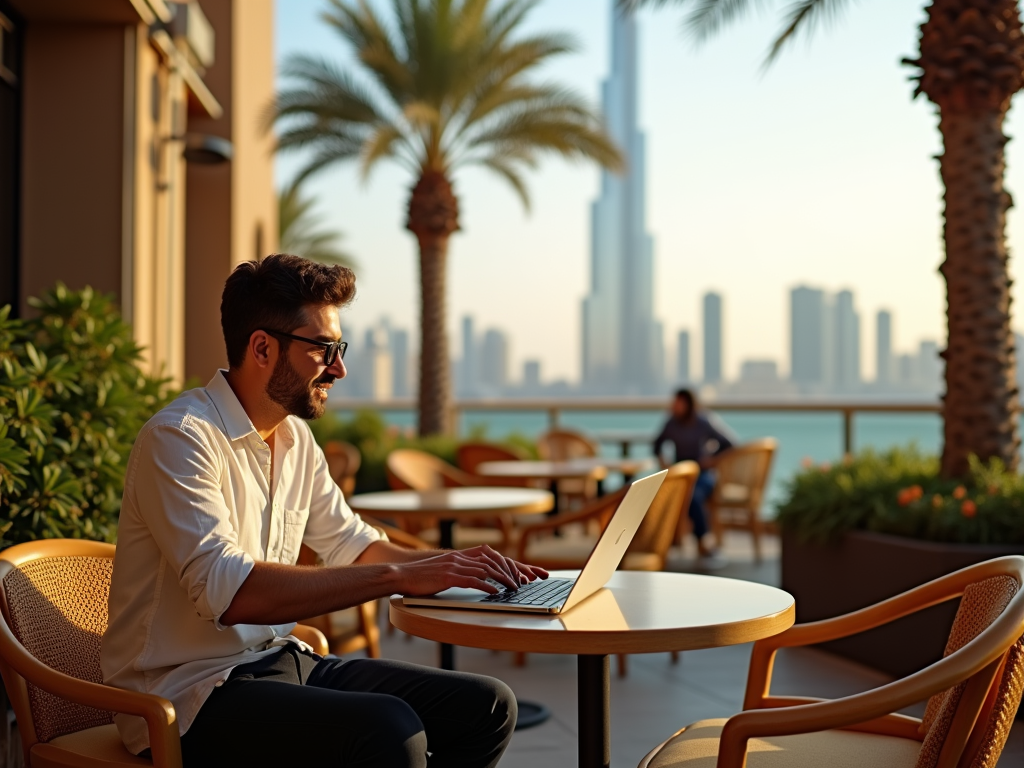Dubai’s remote work economy has experienced significant growth in recent years, reflecting global trends toward flexible work arrangements and digital nomadism. The emirate has become an attractive hub for professionals seeking to balance work and lifestyle in a vibrant, multicultural environment. The confluence of advanced technology, strategic government initiatives, and a high quality of life has positioned Dubai as a key player in the remote work landscape. In this article, we explore the factors driving this growth, the benefits and challenges of remote work in Dubai, and predictions for its future.
Factors Driving the Growth of Remote Work in Dubai

Several factors contribute to the surge of the remote work economy in Dubai. The city’s strategic location, offering proximity to Europe, Asia, and Africa, makes it an appealing choice for expatriates and local talent. Additionally, the booming tech infrastructure allows easy access to high-speed internet and collaborative tools essential for remote work. Here are some key drivers:
- Modern Infrastructure: Dubai boasts a robust digital infrastructure, with extensive fiber-optic networks and co-working spaces designed for remote workers.
- Government Initiatives: The Dubai government has introduced various visa programs, such as the Virtual Work Program, which attracts international remote workers.
- Quality of Life: With a tax-free income, luxurious lifestyle options, and multicultural amenities, remote workers find Dubai an appealing place to live and work.
- Cultural Diversity: Dubai’s diverse expatriate community fosters a creative and inclusive work environment.
- Networking Opportunities: The city attracts startups and global enterprises, providing vast networking opportunities for remote professionals.
The Benefits of Remote Work in Dubai

The transition to remote work in Dubai presents numerous benefits for both employees and employers. One significant advantage is the flexibility in work schedules, enabling professionals to better manage their personal and professional lives. Moreover, remote work can lead to increased productivity as employees create tailored workspaces that suit their preferences. Other benefits include:
- Cost and Time Efficiency: Reduced commuting times lead to lower transportation costs and better work-life balance.
- Access to Global Talent: Employers can hire talent from around the world, expanding their workforce without geographical limitations.
- Health and Well-being: Remote work promotes a healthier lifestyle by allowing more time for physical activity and personal interests.
- Business Continuity: Companies can maintain operations during crises, such as pandemics, by not relying solely on physical office spaces.
Despite its advantages, remote work in Dubai also presents challenges that professionals must navigate. One notable issue is the potential for isolation due to the lack of in-person interactions, which may lead to feelings of disengagement from the team. Additionally, the blending of home and work environments can make it difficult for individuals to establish clear boundaries, impacting mental health. Other challenges include:
- Time Zone Differences: International teams may struggle with coordination across various time zones, complicating communication.
- Legal and Tax Implications: Navigating the legal frameworks for remote work can be complex, especially for international employees.
- Dependence on Technology: A strong reliance on technology may lead to productivity issues during outages or cyber threats.
- Varying Work Cultures: Different cultural approaches to remote work might pose challenges for multinational teams.
The Future of Remote Work in Dubai
The future of remote work in Dubai appears bright, bolstered by ongoing innovations and supportive policies. As more companies embrace hybrid work models, the emirate is likely to remain a central hub for remote professionals. Anticipated developments include further enhancements to digital infrastructure and potential expansions of visa programs tailored for remote workers. Additionally, there is a mounting trend toward sustainability, prompting organizations to consider greener workspace solutions. Ultimately, Dubai’s commitment to fostering a remote work culture will cement its status as a global business hub.
Conclusion
The growth of Dubai’s remote work economy represents a pivotal shift in how professionals view work-life balance. With an ideal combination of dynamic infrastructure, cultural diversity, and progressive government initiatives, Dubai stands out as a prime destination for remote workers worldwide. As challenges are addressed and innovations continue, the future of remote work in this vibrant city looks promising.
Frequently Asked Questions
1. What is Dubai’s Virtual Work Program?
Dubai’s Virtual Work Program allows international professionals to live in Dubai while working for foreign companies that do not have a presence in the UAE. This program offers a one-year renewable visa.
2. Are there co-working spaces in Dubai for remote workers?
Yes, Dubai has numerous co-working spaces equipped with modern amenities, offering excellent networking opportunities and collaborative environments for remote professionals.
3. What are the legal considerations for remote working in Dubai?
Remote workers in Dubai must be aware of visa regulations, tax obligations based on their country of origin, and labor law compliance concerning remote employment contracts.
4. How can remote workers stay connected with their teams in Dubai?
Utilizing communication platforms like Slack, Zoom, and Microsoft Teams can help remote workers stay connected and foster a sense of community with their colleagues.
5. Is it safe to work remotely from Dubai?
Yes, Dubai is known for its safety, low crime rates, and stable political environment, making it a secure choice for remote workers looking for a vibrant city to live and work in.
